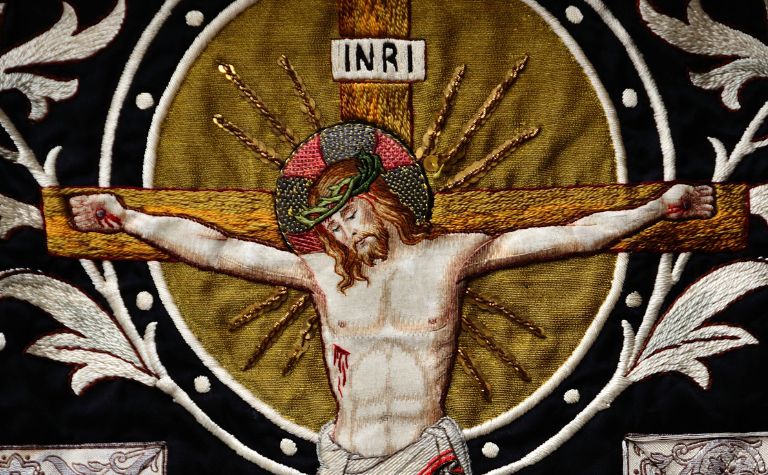The crucifixion of Jesus Christ, along with his resurrection from the dead, is the climactic moment of all four New Testament Gospels. Crosses are common symbols in Christianity because they help people remember Jesus’ death and its meaning. Sometimes decorative crosses include the letters INRI at the top, and many people are curious about what they mean.
The letters INRI represent a four-word Latin phrase that means “Jesus the Nazarene, King of the Jews,” based on John’s Gospel. I is the first letter of the Latin word for Jesus; N is the first letter for Nazarene; R is the first letter for King, and the second I is the first letter for Jews.
Why was a sign posted on Jesus’ cross? Why was it written in three languages? What do the word and terms in the phrase mean? What was Pontus Pilate’s role in making and hanging the sign? Keep reading to learn the answers to these questions and others.

Why was a sign posted on Jesus’ cross?
Matthew, Mark, Luke, and John each mention that when the authorities crucified Jesus, they placed a sign above his head, listing his crime (Matt. 27:37, Mark 15:26, Luke 23:28, John 19:19-20). Some criminals wore a sign around their neck as they walked to their crucifixion, which was nailed to the cross above their heads as they died. Such signs informed and warned observers of committing such crimes.
Jesus’ sign included a Latin phrase
John informs his readers that Pontius Pilate oversaw the sign affixed to Jesus’ cross. “Pilate also wrote an inscription and put it on the cross. It read, ‘Jesus of Nazareth, the King of the Jews’ (John 19:19, ESV). Some English Bible translations render the phrase in capital letters because some Greek manuscripts do. John adds that the words appeared in three languages: Aramaic, Latin, and Greek (John 19:20).
| Language | John 19:19 |
|---|---|
| English text | “And Pilate wrote a title, and put it on the cross. And the writing was, JESUS OF NAZARETH THE KING OF THE JEWS” (KJV) |
| Greek text | Ἰησοῦς ὁ Ναζωραῖος ὁ βασιλεὺς τῶν Ἰουδαίων |
| Latin text | Iesus Nazarenus Rex Iudaeorum |
The Latin text in the table above is how the 4th-century Vulgate, the Latin translation of the Bible, renders the phrase. In other words, it may not represent the exact wording or spelling of the sign above Jesus read because the Gospels only include the Greek term on the sign. Nevertheless, the Latin phrase is where the letters INRI originate.
Why was the phrase written in three languages?
The Roman Empire included diverse ethnic and religious residents. Many had their own subcultures, languages, and belief systems. Aramaic was the common language of the region of Judea, east of the Mediterranean Sea. Latin was the language of the Roman army. And Greek was the common language of the Roman Empire.
New Testament scholar D.A. Carson explains the purpose for rendering the charge in three languages was to communicate to various people groups within the Roman Empire. “The reason for such linguistic enthusiasm is obvious: the Romans had a vested interest in publicizing the nature of the crime that resulted in such a punishment, as a warning to every segment of the populace.” [1]

What do the initials INRI mean?
As explained above, the sign on Jesus’ cross read, “Jesus of Nazareth, King of the Jews.”
What does “Jesus” mean? The name Jesus comes from the Hebrew word for Joshua, meaning “Yahweh saves” or “God saves.” Jesus is the name of the son born miraculously to the virgin Mary and Joseph, who God sent into the world to seek and save the lost (John 1:14; Luke 19:10). The Greek and Latin words for the name Jesus don’t start with “J” but with I or i.
What does Nazareth mean? The town of Nazareth was located in the Galilee region, halfway between the Sea of Galilee and the Mediterranean Sea. Though Jesus was born in Bethlehem, after spending time in Egypt to escape Herod, Joseph and Mary settled in Nazareth, where Jesus grew up (Matt. 2:19-23; Luke 2:39-40). The Gospels refer to Jesus as a Nazarene (e.g., Matt. 26:7, Luke 18:37, Acts 2:22).
How is Jesus a king? Jesus didn’t rule over an empire or a geographical area during his life. Jesus’ kingdom differed from the world’s. For example, the Roman Empire and its leaders eventually ceased to exist, whereas Jesus’ kingdom endures forever (Dan. 7:13-14). In one sense, Jesus’ kingdom was present during his life (e.g., Luke 17:21). In another sense, his kingdom wouldn’t fully arrive until the end of time (Rev. 19:16).
How is Jesus king of the Jews? The New Testament teaches that Jesus of Nazareth fulfilled the Old Testament’s prophecies about the Messiah, i.e., “anointed one.” 2 Samuel, for example, reported that another forthcoming anointed king, similar in some ways to David, would come to the world (2 Sam. 7:16, 22:51). When Jesus came into the world, he proclaimed the good news about salvation to the Jews and Gentiles.

How Christians see God’s sovereignty in Pilate’s actions
Upon seeing the inscription on Jesus’ sign, a Jewish authority figure asked Pilate to change the description. He wanted the phrase to make clear that Jesus claimed to be the King of the Jews. Instead, people could read the sign and conclude that it was identifying as the true King of the Jews. Pilate denied the request, saying, “What I have written I have written” (John 19:20-21, ESV).
Christians often see evidence of God’s sovereignty in the phrase that appears on the sign. While Pilate and other non-believing authorities considered the description an accusation, Jesus was, according to his teaching, the true king of the Jewish people. To the Roman and Jewish authorities, the phrase reflected mockery and a warning. To Christians, it was a proclamation of Jesus’ identity.
Jesus himself saw evidence of God’s sovereignty in Pilate’s decisions and actions (or lack thereof). In response to Pilate asking him if he wanted to defend himself against the accusations made against him, Jesus said, “You would have no authority over me at all unless it had been given you from above. Therefore he who delivered me over to you has the greater sin” (John 19:11).
New Testament historian Craig Keener writes, “John may ironically suggest that Pilate, as God’s unwitting agent (19:11), may carry out God’s will in the Scriptures.” [2]
References:
[1] The Gospel According to John by D.A. Carson. PNTC. p. 610.
[2] The Gospel of John: A Commentary, Vol. 2 by Craig Keener. p. 1138.
Recent Posts
Every year, millions around the globe commemorate the birth of Jesus Christ on December 25th, a date synonymous with Christmas and festive celebrations. However, despite its widespread...
The term "Nativity" is often immediately associated with the birth of Jesus Christ and the stories surrounding this event. Yet, the essence of the word encompasses much more than a single...
